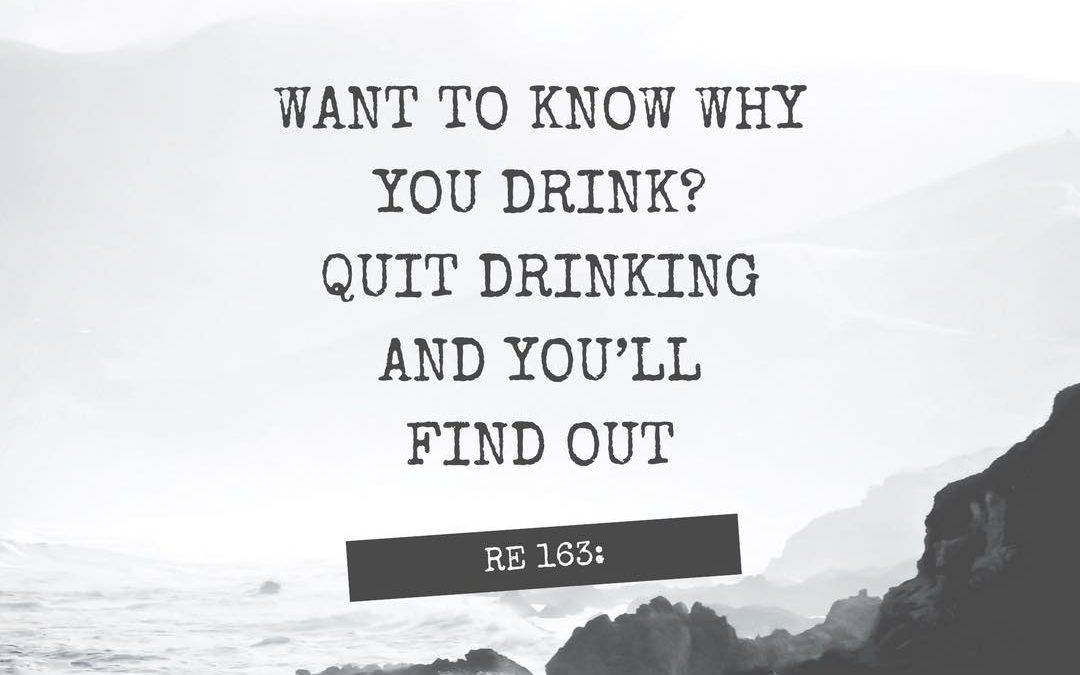
by Paul Churchill | Apr 2, 2018 | Podcast
Podcast: Play in new window | Download
Subscribe to the Recovery Elevator Podcast Apple Podcasts | | More
Why do we drink?
When we no longer drink alcohol, the many reasons we used to drink come bubbling to the surface. What may have started out as a fun activity or a social lubricant often morphs into a way to (not) deal with life’s problems. The barrage of pro-alcohol messages from media and society has the potential to pull the wool over our eyes as the addictive nature of alcohol quietly gets the better of our innocent intentions.
Alcohol promises to help you numb the pain, lower your inhibitions or distance yourself from your problems, but the effect is only temporary. In fact, it often breaks the aforementioned promises and will usually make a bad situation worse.
The avoidance of difficult emotions or situations is likely futile. Choosing to face your problems seems daunting when we are used to drinking them away, but gets easier with practice.
Briddick, with 112 days since his last drink, shares his story:
SHOW NOTES
[8:08] Paul Introduces Briddick.
Briddick is 33 years old, lives in Bellingham, Washington, works in Real Estate, has a girlfriend and a step-son, plays soccer, plays guitar, travel and the outdoors.
[11:15] What was it like for you being self employed?
Heavy drinking was normalized. There was no boss to tell him to stop. Everyone was doing it. He used alcohol to unwind.
[13:00] When did you first start to realize that you might have a problem with drinking?
Late 20’s. He started in high school, but it gradually escalated until he had difficulty stopping once he started.
[14:50] What was it like to drink before soccer games?
For 3 years, he drank before sports. He thought it was normal. He felt terrible physically. He feels lucky that he didn’t hurt anyone during sports or driving.
[16:18] Did you attempt to moderate your drinking, and to what success?
He would avoid drinking in the morning, and avoid hard alcohol. After 3pm it was free for all.
[17:38] Tell us about your anxiety attacks in your early 30’s.
Panic attacks are the worst. You feel something is terribly wrong but you don’t know what it is and you can’t fix it. Right around lunch time he would get panic attacks. The anxiety attacks went away when he quit drinking.
[19:48] What was your reaction to removing alcohol from the situation?
Floored. The anxiety went away. The weight stays off. He sleeps better. He feels more emotionally stable.
[21:13] What was the time frame like for you in regards to the anxiety?
Within the first week. He had a breakdown that lasted for three days. “A bad day for the ego is a good day for the soul.” There is a normal amount of anxiety in anyone’s life. Meditation helps.
[23:59] How did you do it?
He knew inside for years that he was an alcoholic but didn’t want to admit it. He eventually admitted it and had a breakdown. He took it seriously, and treated it like stage 4 cancer. He went to meetings with a friend. The friend is not his sponsor. On step 4.
[27:28] What have you learned most about yourself since you’ve quit drinking?
That he can do it. I can make the choice to not drink today. It’s not about willpower.
[28:41] What’s on your bucket list in sobriety?
He started playing guitar again. He’s learned that he can only focus on one thing at a time. He wants to run a marathon. He wants to keep traveling. He is finding joy in the little things.
[30:15] Rapid Fire Round
- What was your worst memory from drinking?
Waking up with shaking hands and realizing that he was powerless. He regrets rude behavior and drunk driving.
- Did you ever have an “oh-shit” moment?
- What’s your plan moving forward?Staying close to his sponsor and the steps. Enthusiasm can’t be your primary engine.
- What’s your favorite resource in recovery?
The AA community. RE podcast.
- What’s the best advice you’ve ever received (in sobriety)?
You don’t have to stay sober forever, just stay sober today.
- What parting piece of guidance can you give listeners who are in recovery or thinking about quitting drinking?
Get off the fence. Admit it if you can’t stop and if you can’t stop, be serious about it because it will kill you.
- You might be an alcoholic if…
you find empty wine bottles in your car’s glove compartment and side consoles that you don’t remember.
Resources mentioned in this episode:
Connect with Cafe RE– Use the promo code Elevator for your first month free
Sobriety Tracker iTunes
Sobriety Tracker Android
Sober Selfies! – Send your Sober Selfie and your Success Story to info@recoveryelevator.com
“We took the elevator down, we gotta take the stairs back up, we can do this!”
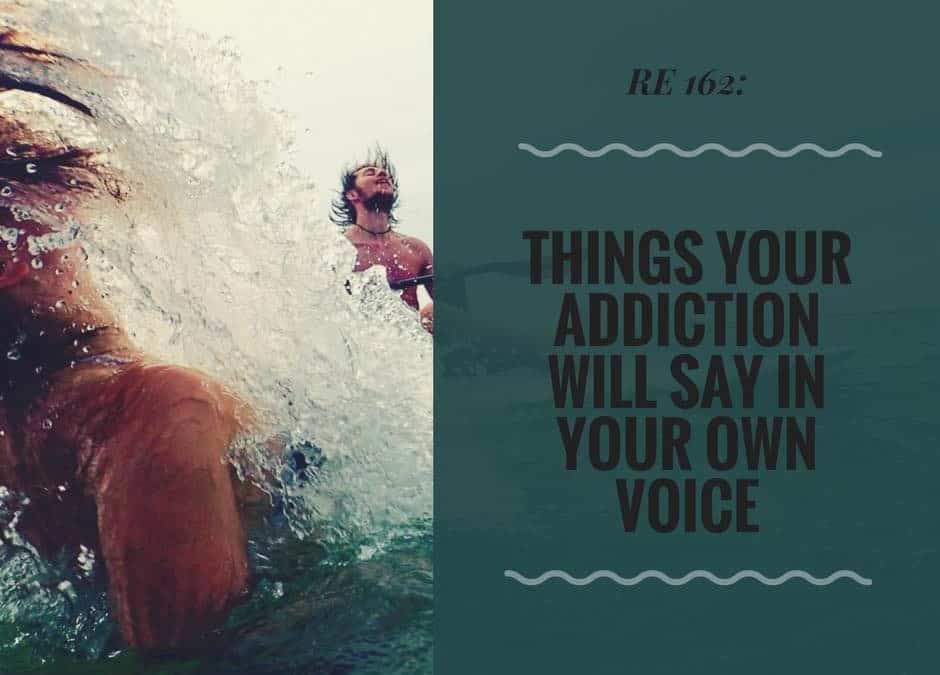
by Paul Churchill | Mar 26, 2018 | Podcast
Podcast: Play in new window | Download
Subscribe to the Recovery Elevator Podcast Apple Podcasts | | More
“Your addiction will lie to you in your own voice.”
Your addiction will often appear to you as a voice in your head that sounds like your own rational thoughts. It will tell you that it’s not really that big of a deal, that you are really in control or, in many cases, will conveniently wipe your memory (the ISM or “incredibly short memory”) so you won’t recall what a tough time you had getting through that last hangover.
Be on the lookout for justification phrases such as:
“But I didn’t really have a problem before”
“Everyone else drinks like I do”
“This next time will be different”
“I’ve quit once, I can quit again”
“The only person you’re negatively affecting is yourself”
“I’m cured! I just went [X amount of time] without drinking!”
“Everyone else is having so much fun”
“I got this.”
Stay vigilant in protecting your subconscious mind from thoughts like these and you will have an easier time avoiding relapse. It’s much easier to stay sober than it is to get sober, and staying sober isn’t always easy.
Mike, with almost two years since his last drink, shares his story
SHOW NOTES
[8:05] Paul Introduces Mike.
Sober over 600 days. 37 years old, from California. A professional musician that has worked in California, Boston and around China, as well. He now lives with his girlfriend in Hong Kong. Mike does for the show notes for each podcast episode.
[11:10] You quit drinking and smoking at the same time?
Yes. Smoking was getting in the way of his singing. He read Allen Carr’s “Easy Way To Quit Smoking” and at some point he realized that he wouldn’t be able to quit smoking without quitting drinking. He committed to 30 days. Felt great so he kept going.
[13:58] When did you realize you were going to have to quit drinking also?
When he moved in with his girlfriend. He realized that his actions were having consequences that were affecting other people, and that if he really cared about this person and himself, he would have to clean up his act.
[15:45] What were the indicators that you had a problem with drinking and/or smoking?
He had a therapy session, and the therapist helped him realize that his problem was the drinking, and not what he had thought.
[18:27] At that point, did you attempt to quit or moderate?
Yes. Upon advice from his father, he tried to moderate his drinking by only drinking during work hours. It was a form of torture as his whole day became centered around waiting for work to begin. Eventually it lead to him breaking the rule and drinking all day for weeks.
[20:23] So the willpower technique was torture?
Yes. While the rules were in place he found himself constantly distracted and thinking about drinking. His brain was hijacked by both tobacco and alcohol.
[22:40] How did you get through those difficult cravings after you quit?
He started learning martial arts, and it gave him the tools he had been missing. Previously, he had been using alcohol to relax intense feelings of anxiety or discomfort, but now he was able to use the techniques that he learned at the martial arts classes.
[24:25] Was everyone kung fu fighting?
In Hong Kong, not as much, but globally, yes.. more people are practicing Kung Fu now than ever before.
[26:54] What do you do when the uncomfortable feelings or cravings come?
He focuses on the physical sensations of the craving. He tries to keep his body from becoming static, and thus paralyzed by the craving. He breathes, moves, walks, gets fresh air, whatever is necessary to keep the craving from tensing him up.
[29:19] What is it like to continue working in the nightlife now that you’re sober?
When you’re still drinking, even the thought of trying to quit seems like an insurmountable task, but once you’ve quit and, inevitably, you change the way you see things, the environment in which you were in before is not what it seemed.
[32:30] What’s on your sobriety bucket list going forward?
He’s interested in the physical activities he always turned down while he was drinking and smoking. He wants to travel more and say yes to the things he said no to in the past.
[34:05] What is it like to not have the addiction causing you to feel unsolicited fear?
It’s liberating. There are so many positive experiences to be had in life. Sobriety is an opportunity that begets other opportunities.
[34:53] What is it like to be in recovery in Hong Kong?
He knows someone who has been to AA in Hong Kong but he hasn’t been to any meetings himself, yet. He found solace in online resources, and he considers his online communities to be his recovery community.
[37:10] Rapid Fire Round
- What was your worst memory from drinking?
A really bad hangover in which he could barely function.
- Did you ever have an “oh-shit” moment?
His skype call with the therapist during which she pointed out that his main problem was probably drinking. Before that conversation with her, he had asked his friends about his drinking and they had all reassured him that it was normal. She was the first one to point out that it was probably the cause of his issues.
- What’s your plan moving forward?To continue to set my priorities on health, not overdoing it, to take it a day at a time, never say that “I got this”, to stay vigilant and positive.
- What’s your favorite resource in recovery?The Recovery Elevator podcast, That Sober Guy podcast, Belle’s One Minute Message podcast. The Allen Carr books.
- What’s the best advice you’ve ever received (in sobriety)?
To begin today. If you are suffering, definitely begin today. Don’t be afraid, it’s better on the other side.
- What parting piece of guidance can you give listeners who are in recovery or thinking about quitting drinking?
To begin, to stay focused and to not beat yourself up.
- You might be an alcoholic if…
it’s ever an absolute emergency that you don’t have alcohol, and you find yourself planning accordingly.
Resources mentioned in this episode:
Easy Way To Quit Smoking – A quit aid by Allen Carr.
30 Day No Alcohol Challenge – A quit aid by James Swanick
Standing at the Water’s Edge – A book about creative immersion by Dr. Anne Paris
Connect with Cafe RE– Use the promo code Elevator for your first month free
Sobriety Tracker iTunes
Sobriety Tracker Android
Sober Selfies! – Send your Sober Selfie and your Success Story to info@recoveryelevator.com
“We took the elevator down, we gotta take the stairs back up, we can do this!”
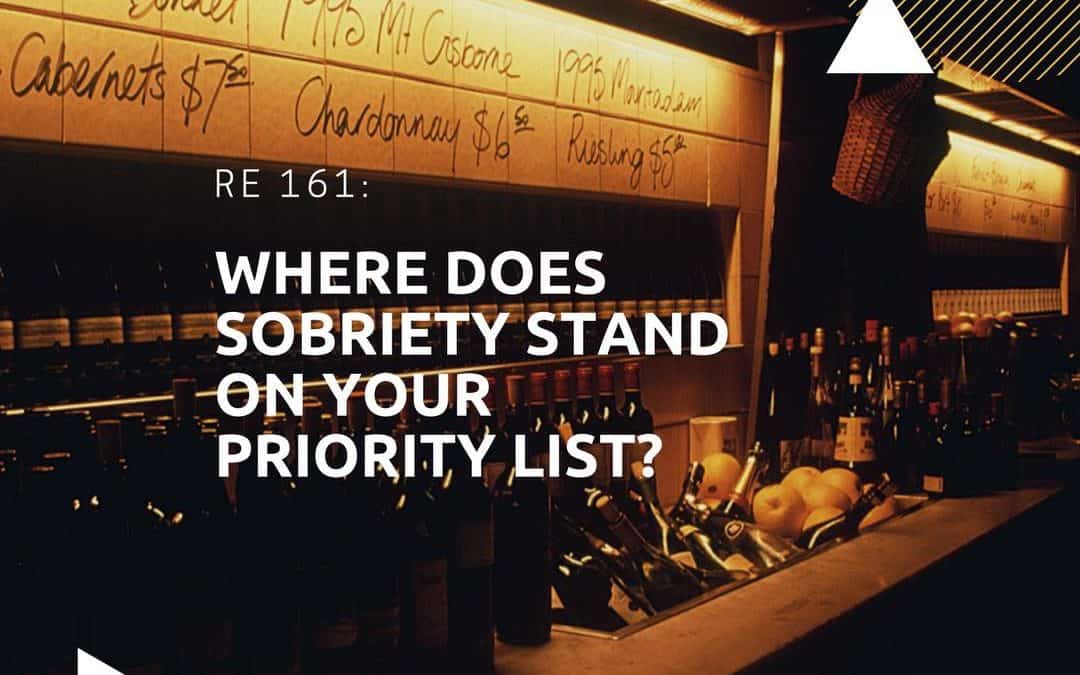
by Paul Churchill | Mar 19, 2018 | Podcast
Podcast: Play in new window | Download
Subscribe to the Recovery Elevator Podcast Apple Podcasts | | More
If you haven’t done so already, make sobriety your number one priority.
It may seem selfish to prioritize yourself over other things, but to really be present and of service to our loved ones and the community at large, we must take care of ourselves. When we root ourselves in something real, concrete and bigger than ourselves, our daily struggles and problems often feel small by comparison.
“Everything’s going to be okay as long as we don’t drink.”
Ryan, with over two since his last drink, shares his story..
SHOW NOTES
[9:10] Paul Introduces Ryan.
Ryan’s been sober for over two years. He decided to quit after a trip to the hospital. He’s from Dallas, TX. Works for an ad agency. Has a 3-year-old son. Has a dog. Is currently focused on raising his son. He and his wife enjoy scuba diving.
[12:45] When did you first notice that you had a problem with drinking?
It began in college. He noticed it affected him differently than other people. He experienced withdrawal symptoms early on after casually drinking. A trip to the doctor put things in perspective for him. The doctor asked him to quit for 30 days, and he realized that he couldn’t stop.
[17:41] What age were you when you realized you had a problem?
Late 20’s.
[18:10] So what happened from late 20’s until now?
He tried many different things. A therapist diagnosed him as depressed. He was medicated. They assumed the problem was something other than alcohol. He drank while medicated and had a psychotic episode. He cut out the medication but kept drinking. He had a week to himself and he drank the whole time. His anxiety increased dramatically. He started hiding his alcohol from his partner.
[23:20] Did things change when your child was born?
Eventually. The morning he found out his wife was pregnant he tried to quit. His drinking got worse. As the due date approached his fear increased. He made sure he had emergency alcohol nearby in case they had to run to the hospital. His worst memory from drinking was being drunk for the birth of his child. He kept drinking after the birth. His wife got involved and tried to help him quit. He continued drinking even while seeing his therapist. Finally went to detox and felt like he was saying goodbye to his best friend. He did an intensive outpatient program. Joined AA. Started working the steps.
[32:05] Talk to us about the time between your treatment and your sobriety date.
He relapsed once. He learned that a relapse happens long before your first drink. He thought he just needed time, but he learned that his thoughts lead to his relapse. He began hiding liquor again. It came back in full force. He realized what he had given up by going back to drinking.
[34:35] So how did you end up quitting again? What is your recovery like today?
The relapse made him realize that he was powerless over alcohol. He stepped up his commitment to AA. He found sobriety groups to be a part of. His family responsibilities fuel his sobriety.
[37:00] What was it like to include your partner in your sobriety?
It was a great decision. It tested the relationship, but they came out stronger. She quit drinking as well.
[39:10] What’s on your bucket list in sobriety?
I just want to be my best.
[39:40] What is your plan in sobriety moving forward?
It’s all about making the next right decision. Focus on what one can control.
[40:45] Rapid Fire Round
- What was your worst memory from drinking?
- Did you ever have an “oh-shit” moment?During his last relapse, he realized “I don’t got this”.
- What’s your plan moving forward?
- What’s your favorite resource in recovery?His family. This podcast is his favorite.
- What’s the best advice you’ve ever received (on sobriety)?“KISS”. Keep it simple stupid.
- What parting piece of guidance can you give listeners who are in recovery or thinking about quitting drinking?If you can do this, you can do anything.. and you can do this. You’re gaining more than you’re giving up.
- You might be an alcoholic if…you end up in the hospital because you didn’t drink.
Resources mentioned in this episode:
Connect with Cafe RE– Use the promo code Elevator for your first month free
Sobriety Tracker iTunes
Sobriety Tracker Android
Sober Selfies! – Send your Sober Selfie and your Success Story to info@recoveryelevator.com
“We took the elevator down, we gotta take the stairs back up, we can do this!”
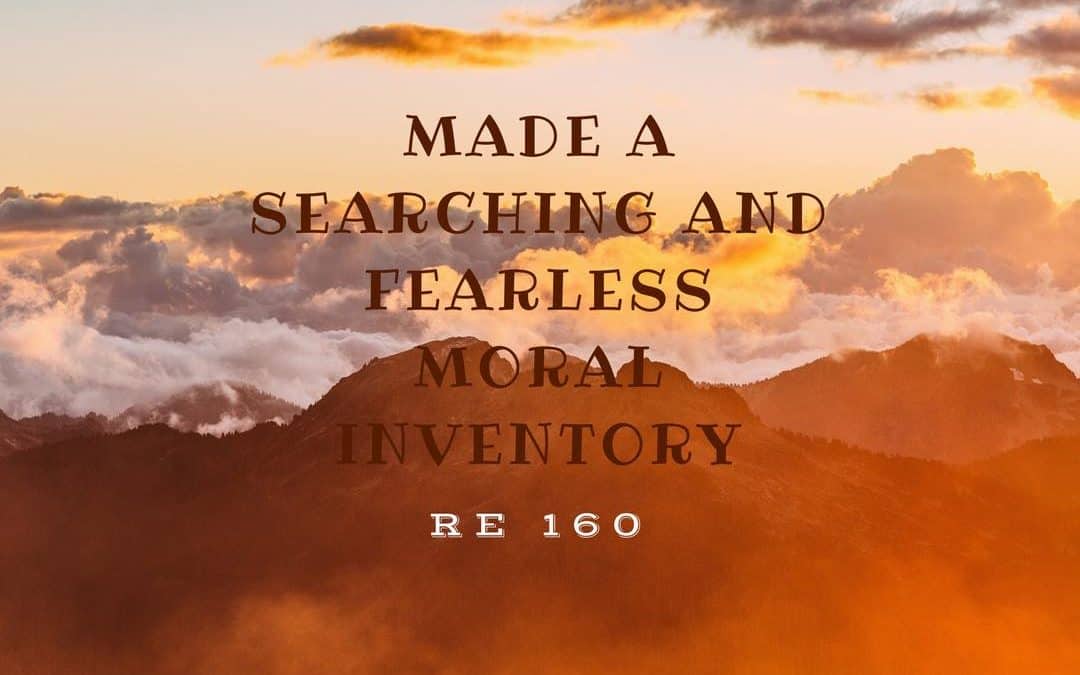
by Paul Churchill | Mar 12, 2018 | Podcast
Podcast: Play in new window | Download
Subscribe to the Recovery Elevator Podcast Apple Podcasts | | More
Step Four – “Made a searching and fearless moral inventory of ourselves”
The Recovery Elevator Podcast isn’t affiliated with Alcoholics Anonymous, but we cover the steps due to listener demand.
For easy lookup:
episode 142 was Step 1
episode 146 was Step 2
episode 152 was Step 3.
The fourth step is probably everyone’s least favorite step, as it involves things we don’t want to do… face our past, our mistakes, our scary thoughts, emotions and current problems. Though it can be scary, it is still one of the most important steps in recovery. Alcoholism is merely a symptom of underlying inner conflict, delusions and/or flaws in our character that need to be faced, and where possible, overcome.
The key is honesty. While working step four, we get a new perspective on the bigger picture and see ourselves and our behavior in a new way that helps us to move forward without fear and allows us to embrace a healthy self-image.
This step is all about bringing unconscious behavior to light. We gradually realize that only we can change, and not change others. This step is meant to be done with your sponsor.
Kerry, with 12 days since her last drink, shares her story…
SHOW NOTES
[13:25] Paul Introduces Kerry.
Kerry lives in Los Angeles, is 47 years old, is married, has two children and four dogs. She loves reading, the movies, traveling, and book stores.
[17:40] When did you first realize that you had a problem with drinking?
In her 40’s. She started in her teens, and as an adult, she drank daily. She struggled to stay sober while she was pregnant. Her drinking ramped up after her second child, in her 40’s. She thought her drinking was normal, so she found it hard to believe she had a problem.
[22:00] What were some of the rules you put in place?
She tried to only have a glass of wine with dinner, but it didn’t work. She tried to insert a glass of water between each glass of wine. The rules didn’t work, which only made her feel down on herself.
[25:00] When was your first attempt to quit?
2 and ½ years ago. Her friends invited her to AA meetings. She “white knuckled it” about three weeks. Relapsed. This added more shame, which leads to more drinking. She kept trying and has been in and out since then.
[27:20] Was there one moment that changed it for your or was you generally sick and tired?
She was sick and tired. She became ashamed when her daughter witnessed her really drunk.
[29:00] What are some of the things in your recovery portfolio and what will you do to make it stick this time?
She wakes up early and meditates. She reads a chapter of “Living Sober” every day. She reaches out to sober friends. She goes to meetings occasionally.
[32:49] What benefits do you see with 12 days in sobriety?
More energy. Better sleep. No hangovers. Being more aware and present for her kids. Better memory.
[34:41] How are you overcoming the internal dialogue that is trying to convince you to drink?
She knows it’s her addiction talking and it helps her to compartmentalize the thought. She uses meditation techniques to let it pass.
[36:40] How has it been with your husband?
He’s been supportive. He also thought she was drinking too much. He’s compassionate and helpful.
[40:35] What’s on your bucket list in recovery?
She loves traveling. She intends to use the money saved by not drinking to fund a trip to Amsterdam. She wishes to be more present for herself and her family.
[43:10] Rapid Fire Round
- What was your worst memory from drinking?
Before she got married, she went to a dinner party and got drunk. She left the party without telling anyone, and she threw up on the subway.
- Did you ever have an “oh-shit” moment?
Her husband noticed that she was slurring her words and pulled aside to ask her to stop drinking.
- What’s your plan moving forward?Keep up with the morning meditation. More meetings. Find a sponsor and work the steps.
- What’s your favorite resource in recovery?She likes reading other people’s stories. She’s reading the books by Caroline Knapp and Sarah Hepola. (See mentioned resources below)
- What’s the best advice you’ve ever received (on sobriety)?
“Follow the drink to the end”. One glass isn’t just one glass.. it ends up with her throwing up and a terrible hangover.
- What parting piece of guidance can you give listeners who are in recovery or thinking about quitting drinking?Just do it. Start today. Don’t set a date, just do it today.
- You might be an alcoholic if…Y
ou open a bottle of wine, pour out two glasses and pour the rest down the drain. Then, after you’ve had the two glasses, you go out to the liquor store and buy more wine to keep drinking.
Resources mentioned in this episode:
Recovery: Freedom from Our Addictions – A book by Russell Brand
Living Sober – an introduction to AA and recovery.
Blackout: Remembering the Things I Drank to Forget – by Sarah Hepola
Drinking: A Love Story – by Caroline Knapp
Connect with Cafe RE– Use the promo code Elevator for your first month free
Sobriety Tracker iTunes
Sobriety Tracker Android
Sober Selfies! – Send your Sober Selfie and your Success Story to info@recoveryelevator.com
“We took the elevator down, we gotta take the stairs back up, we can do this!”
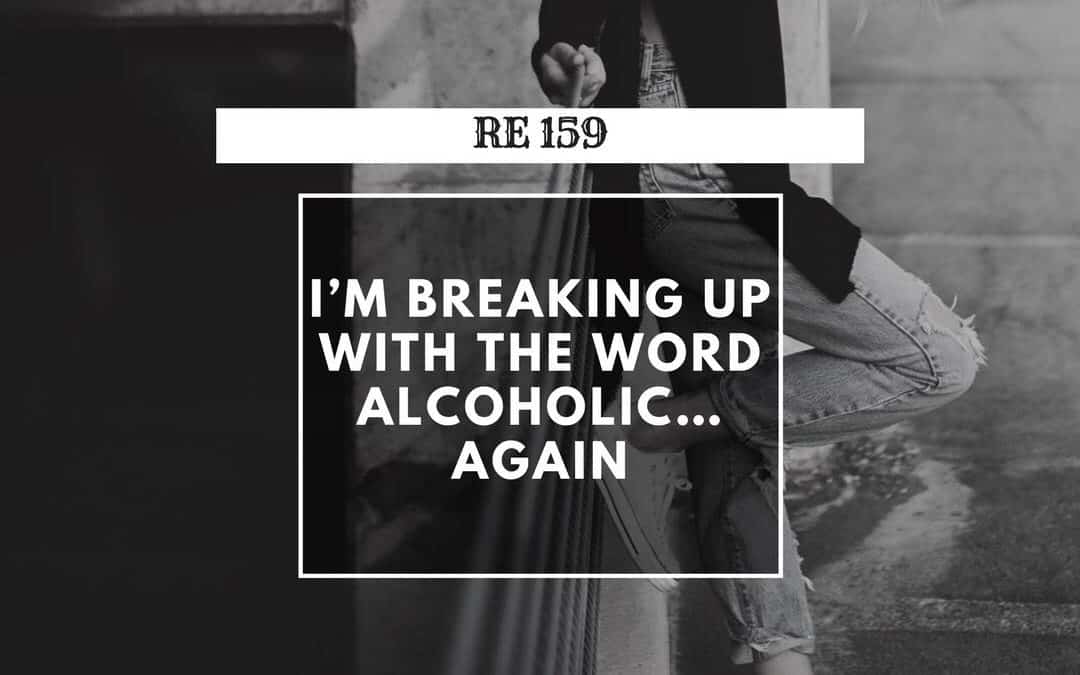
by Paul Churchill | Mar 5, 2018 | Podcast
Podcast: Play in new window | Download
Subscribe to the Recovery Elevator Podcast Apple Podcasts | | More
“Enhanced Dopamine Receptors” or EDR
The word “alcoholic” carries such a stigma in today’s society and also implies that one’s addiction to alcohol is somehow different compared to other addictions. A more accurate way to describe the situation of those struggling with alcohol or any addiction is that they have “enhanced dopamine receptors.”
Jim, with 57 days since his last drink, shares his story
SHOW NOTES
[11:00] Paul Introduces Jim.
Jim is 47 years old, lives in Waukegan, Illinois. He’s a truck driver and a father, with a 12-year-old son. He enjoys reading and working out.
[12:37] When did you realize you had a problem with alcohol?
He always knew that he drank more than “normal people.” Started drinking early at 14. In recent years it became a problem. Recently he drank an entire weekend.
[14:30] Are you viewing it as a permanent decision?
Yes, and he arrived at that decision because the moderate approach never seemed to work. “It’s a hell of a lot easier to stay sober than to get sober.”
[16:10] Did you try to regulate your drinking in any way?
Yes, he put rules in place and actually followed them, but suffered the entire time.. and it made him realize that he had a drinking problem.
[19:40] Did you hit rock bottom?
He believes he’s a high bottom drunk. Most of the conflict was in his head. His bottom was more of an emotional bottom.
[20:55] Were those emotions the reason you quit drinking?
His inner dialogue was mostly negative. He drank mostly to silence his thoughts.
[23:04] What were your repeated Day 1’s like and how did you break the cycle?
He made a commitment to myself, to be honest about it. He decided he wasn’t going to let it beat him. He gave himself permission to fail.
[27:04] How did you break the hamster wheel?
He went to AA; he joined online groups, he started going to therapy. He made a “relapse prevention kit”. The danger was usually boredom and over analysis.
[28:50] How do you deal with cravings?
He differentiates between cravings and urges. He realized that they’re temporary. “Don’t make a permanent solution to a temporary situation.” The feelings will not last forever.
[30:00] What have you learned about yourself in your sobriety?
He says he still needs a lot of work. He has to be vigilant to ensure he’s pointed in the right direction.
[32:30] What is your proudest moment in sobriety?
Staying sober for this long. He intends to keep going.
[33:30] What was the retreat like for you?
One of the best things he ever did. He enjoyed it thoroughly.
[36:25] Rapid Fire Round
- What was your worst memory from drinking?As a teenager, drank tequila. Got sick, threw up his retainer.
- Did you ever have an “oh-shit” moment?When he drank all weekend.
- What’s your plan moving forward?Just continue on the path. Continue to learn.
- What’s your favorite resource in recovery?
- What’s the best advice you’ve ever received (on sobriety)?“Don’t judge your insides by someone else’s outsides.”
- What parting piece of guidance can you give listeners who are in recovery or thinking about quitting drinking?Start stacking days. It’s easier to stay sober than to get sober. You’re not making any sacrifices; you’re gaining opportunities.
Resources mentioned in this episode:
This podcast episode is brought to you by Zip Recruiter. Visit Ziprecruiter.com/elevator to post jobs for free.
Connect with Cafe RE– Use the promo code Elevator for your first month free
Sobriety Tracker iTunes
Sobriety Tracker Android
Sober Selfies! – Send your Sober Selfie and your Success Story to info@recoveryelevator.com
“We took the elevator down, we gotta take the stairs back up, we can do this!”







